How would you feel if your country was being torn apart by a gruesome war? Knowing that your family, your friends, and everything that is dear to you is in grave danger? Sadly, this year, war has been on the rise in the middle of Europe – putting millions of people in this horrifying position.
Our TEDx speaker Kim Phuc, more commonly known as “The Napalm Girl” was portrayed in an iconic photo taken during the Vietnam war in 1972 that would shock the world. When the terrors of war reached her once peaceful village and ravaged her life, Kim had no choice but to rise above.
However, she is no longer a victim of war – she is a survivor who strives to change the world with peace, love, and forgiveness. Today, Kim Phuc is an advocate for peace and follows her mission with great passion: She is a UNESCO Goodwill Ambassador for culture of peace and has started her own foundation, the KIM Foundation International, to help children who are suffering similar experiences to rise up to a better future and beautiful life.
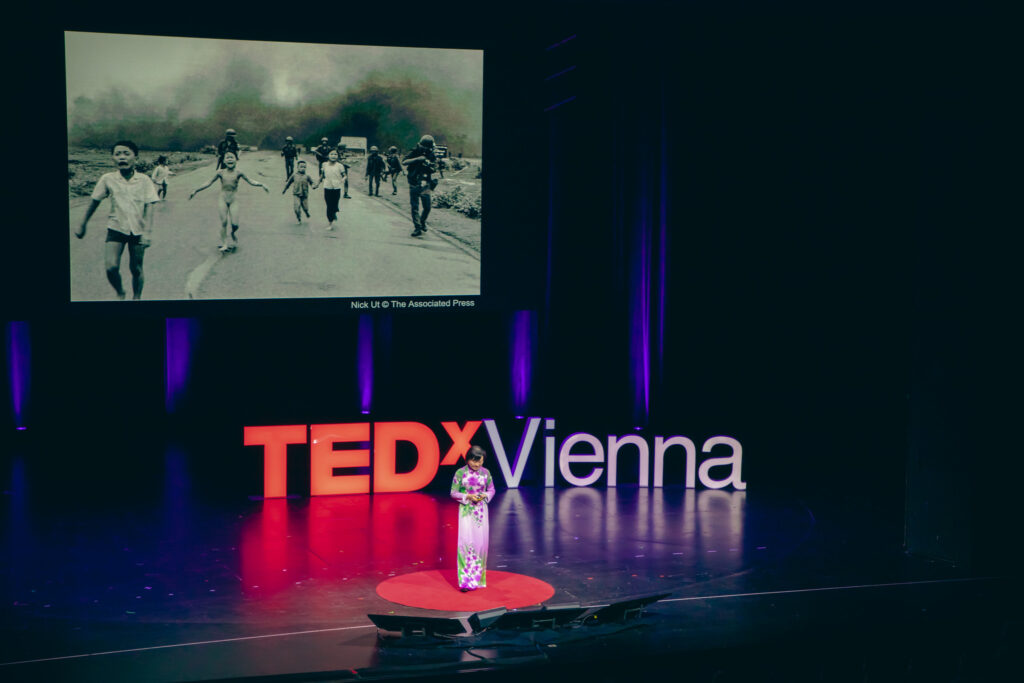
Kim, as you know, everybody has a story to tell, and today we want to hear yours. So first, please tell us a bit about yourself and how your life so drastically changed on June 8th, 1972 when you became “The Napalm Girl”.
Of course, I know that everyone has a story to tell. Right? My story may be a little bit emotional. And as I’m a human being, sometimes I just couldn’t understand. How did I survive? How did that little ordinary girl who just turned nine years old, survive? It’s a tragedy that came into her life. My life was forever changed. And so? Well, I don’t know how to start, it’s difficult. I have to tell you that I grew up in a very small village in the south of Vietnam. My village was really peaceful and my parents had a beautiful home and abundant land with so many different fruit trees and animals. I spent my days doing what every child loves to do: hanging out with my friends, gossiping with my girlfriends and reading books. I liked going on fun little adventures on my family’s property and climbing the trees to pick ripe, delicious fruits. Every time I came home from school and entered the house I felt like a princess. I’m so proud of what we had, of our life before the war. But then, on June 8th, 1972 the chaos of war reached my peaceful village and my life was forever changed.
And then, the tragedy that would change your life forever happened and was forever captured on film by the now famous photographer Nick Ut. How did everything happen from your perspective and how does Mr. Ut tie into your story?
Our house was occupied by soldiers and so we escaped to our local temple. We hid in that temple with some South Vietnamese soldiers and some other villagers for about three days. I remember that on June 8th, 1972 after lunch, the soldiers were informed that there would be an air strike on our local temple. They got us all to run out of the temple. As I was running down Highway One from the temple courtyard I first heard the roar of the planes coming in towards me before I even saw them. To be honest, I was just a little girl, wishing I could run fast. I looked at the sky and located where the noise was coming from. I saw four black canisters falling down from the jet’s belly and heard the haunting noise that stays with me to this day. And then, suddenly, the fire was everywhere around me. I didn’t know, I didn’t see anyone else. The fire then burned off my clothes. My left arm was burned by the fire, so that’s why I used my right hand to try to get rid of the fire. (Holding up her sleeve to show her right hand) You can see my right hand got burned as well. It was a miracle that my feet weren’t burned. I was in shock and I was terrified. I still remember my thoughts at that time: “Oh my goodness, I got burned and I will become an ugly girl. The people will see me differently.” Then I was able to run out of that fire. I saw my brothers and my cousin and some soldiers around there. So we kept running and running and running down the road. I was completely naked,confused and repeating over and over and over: “Too hot, too hot.” That tragedy was caught on film. This is when Nick Ut, the Associated Press photographer took that iconic photo that would shock the world.
What can you recollect from this whole scene? Did you have any idea a picture was being taken? If I remember correctly, this is where Nick comes in.
Gladly, no. I didn’t know they were filming or that they took a picture, nothing. I remember after that picture was taken I continued running down the road. When I got tired from running, I stopped. Because I was calling that it was too hot, one of the soldiers tried to help and gave me some water to drink. He also poured water over me. The napalm was on my body and when the water made contact with my skin, it started boiling which made it burn even deeper. So I passed out. I later learned that Nick immediately put down his camera and rushed me to the nearest hospital. He saved my life. That is the story the people who were there told me – and it became my story because I lost consciousness, I don’t remember anything else.
Obviously, your life drastically changed after this incident and became one that has been greatly focused in the media. It would be interesting to learn how, from your experience, you’ve reflected upon this whole role of the media in your life, and specifically directed at Nick Ut’s role as a journalist.
Pictures tell us the truth, but sometimes it’s not beautiful, it is ugly, like my picture. Pictures tell us a thousand words, they show us as human beings.
It is beyond my imagination why children have to suffer. It’s telling the true story, you know. We cannot accept how people suffer like that. I think because of that point, this has a big impact on people, including journalists, the government, including everyone as an actor – as human beings. But for me at that time, as a little girl, I did not think about becauseI just thought to myself “Why? Why did he take my picture, ugly like that?” I was naked. I was a little girl. Why was it printed and why did I, the little girl in the middle, have to be naked while my brothers and my cousin had clothes on. And in the beginning I just remember myself thinking “Does anybody understand my pain?”
You spent 14 months in the hospital after this terrible experience.
I know that my story is very unusual. Despite all the circumstances, I chose to be thankful. And so, I learned so much step by step, day by day. Daily, I learned about and for myself. My recovery was very long and very difficult: 14 months in the hospital, and 17 operations. You ask, “How did you survive?”, and really, I ask myself the same question. But I returned to the world with one goal in mind: I wanted to become a doctor. I had spent so much time with doctors and nurses, and I just wanted to be like them. They inspire me. I received their love and their help – I wanted to help others as I was helped. Unfortunately, I was never able to achieve that dream. Because, again, another tragedy came over me. This time it was not a bomb but something else: My picture had become incredibly famous and now I had been discovered as the subject in that photo. After this discovery, I was used by the government as propaganda. My freedom was stripped away and I had no more privacy.
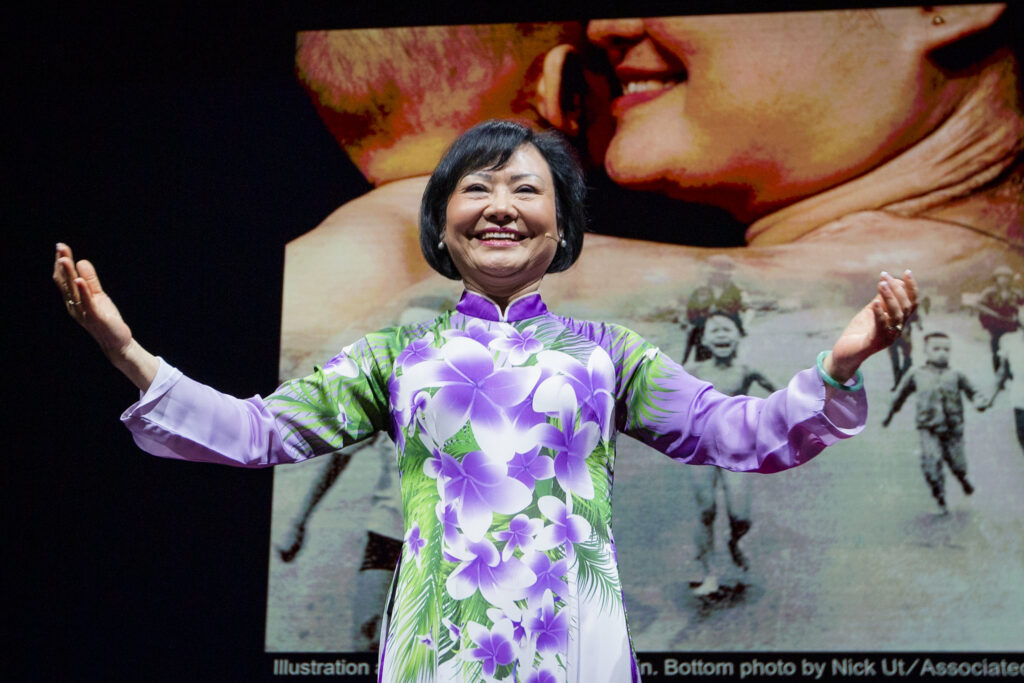
It shines through that peace and freedom is and always has been one of your main objectives. Can you tell us, how did you manage to find the strength to make peace with what happened to you? What is your advice to other people who are maybe struggling to make peace with some situation or something within themselves? How can they also achieve this sense of clarity?
I went through all the difficulties inside and outside. I have to deal with them physically and emotionally. You know, my skin, my burns, the scars on my body were treated. But it’s so hard that the wounds in my heart are still there. And because of that, I went to such a dark place. So many times I felt like taking my life but at the bottom line I found that I just wanted to know why I had to suffer like that. It would have been so hard to end my life like that and deep down in my heart, I just wanted to search for the purpose of my life. In searching for the answer, I discovered Jesus in a Bible in the local library. It wasn’t easy, but on that day I started my journey of forgiveness with Jesus. From there, I learned to be positive. I learned not to count what I lost but to count what I have. You see, all of my body got burned because the four bombs exploded just behind me. You see my face and my hand, still beautiful, right? So I count that as a blessing. And even though my body got burned, my feet weren’t. I was able to run out of that fire. And the picture. Of course, I didn’t like that picture. But later on, I learned that this picture could be extremely powerful to fight for peace.
That’s my answer to your question: I want to give back to the people who helped me. I am still alive. I didn’t want to live in the darkness forever, I had to choose to change my perspective on that picture, and instead of seeing that picture as a curse, I began to see it as a blessing. It became a powerful gift for me to work for peace. I thought of my child. I finally had freedom in Canada, and I became a mother. That’s why at that time I thought of my child and how I wanted to make a difference in this world. So my child could be free, and not suffer the same way I did. That is the motivation for me to move on. I made a decision to let go of all the darkness in my heart and to learn to forgive people to do much better than in my past. When I was nine I thought I didn’t have a choice but to suffer. But now I have a choice. I learned that I always have a choice to make: to be thankful. I just really want to move on in a positive way. I’m not focused on the pain. I focus on something else. I learned that with love, I can continue to share my message about love, hope, and about peace.
This is my dream, I will continue to do that for the rest of my life.
A truly beautiful and inspiring message, Kim. You are a clear example of the fact that, whatever you focus on, grows. For TEDx Vienna this year, the topic is On the Rise. So many beautiful but also agonizing things, like war, are on the rise once again. To end this on a positive note: What is on the rise for you?
It was very hard for me on that day, the 24th of February when the war in Ukraine started. My mom and I just held hands and cried. My heart was broken.
My heart is broken for all the people who lost their lives. To be honest I’m so so happy that I was able to be there to welcome the Ukrainian refugees to safety and freedom in Canada. I was there to give them hope. I just wanted to tell them “Don’t give up hope. Just hang in there.” I said, “I have been in your shoes and I hope that my presence here will give you hope. Right now, even though you are facing unknown things around you, please raise up. Hold on there. You know that people around the world love you.”
So hope is on the rise for you?
Yes! That is my message. Just hang on. Don’t lose hope. Look at my life 50 years ago. When you are facing war, war is real, and this is reality. And so for me, the war that is going on right now reminds me constantly of what happened to me. The war continues to ravage people’s lives, just like it did mine. Normally I’m not living in the past – I just learned from the past and moved on. That’s why it made me who I am now.
My life’s goal is to continue to share the message. My message is love, peace, and hope, and I will continue to share it. That’s why I am so happy to be a part of TEDxVienna this weekend. I’m so thankful that I have the opportunity to continue to contribute and to give back what I have received.
Kim’s full talk is now ready to watch here:
Reviewed by Anita Ghoreshi.
Photos by Cherie Hansson, Gabriel Bangura, and Nikita Russ.

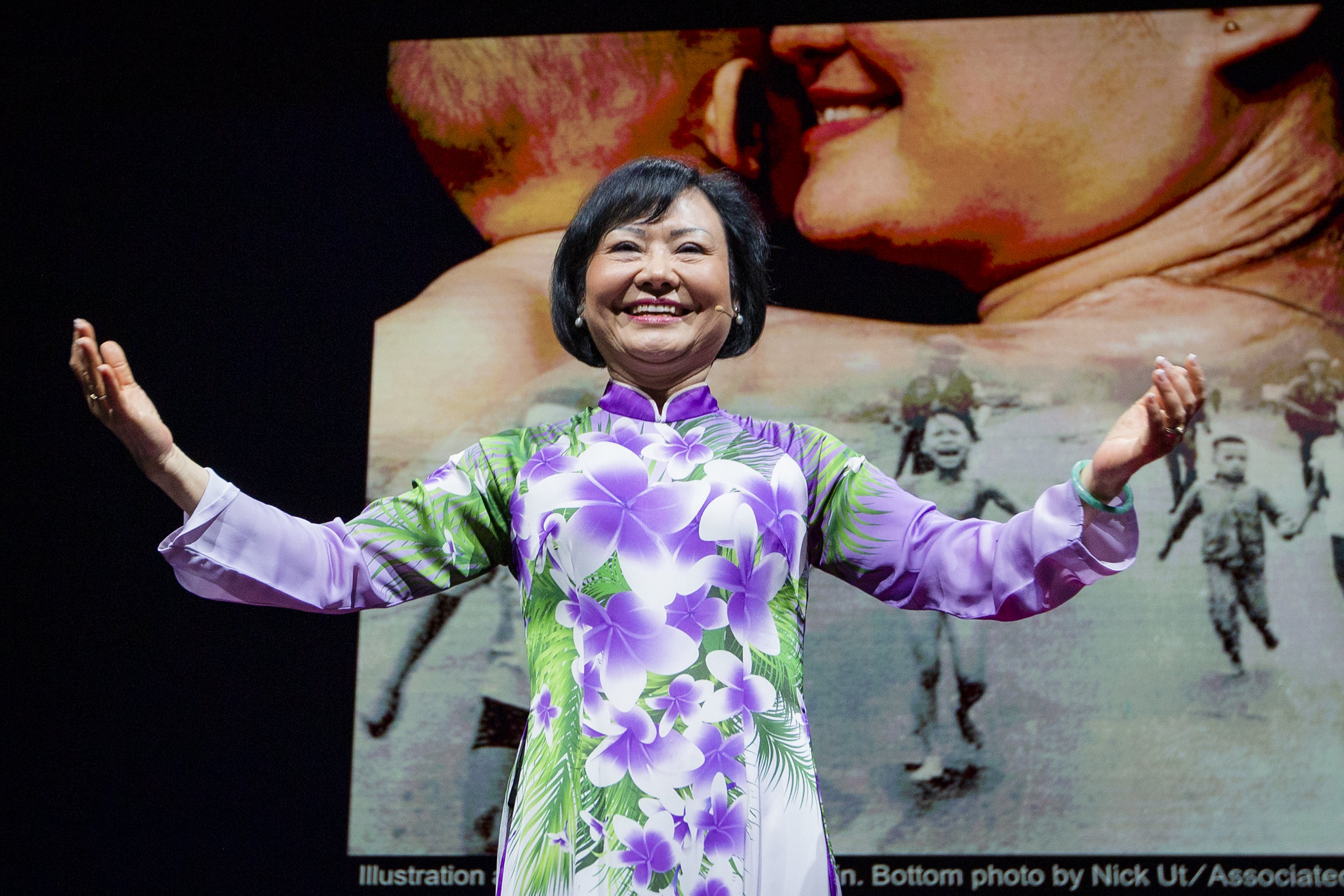
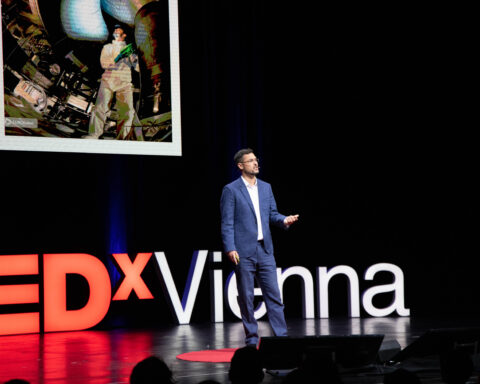
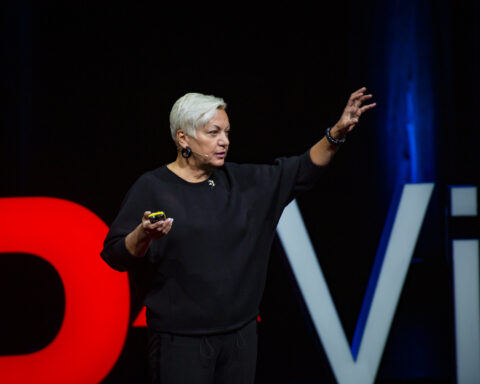

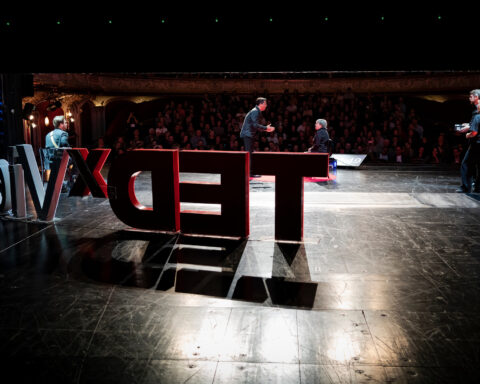
Love yourself first and all the other things conforms. You truly need to adore yourself to finish anything in this world.